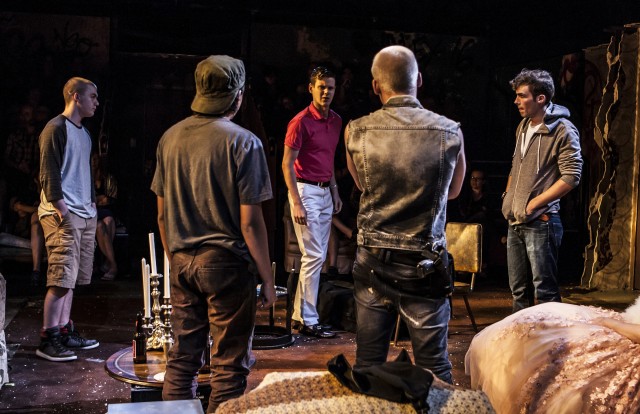
Brothers Darren (Jack DiFalco) and Elliot (Zane Pais) are caught up in some shady dealings in Philip Ridley’s MERCURY FUR (photo by Monique Carboni)
The New Group at the Pershing Square Signature Center
The Romulus Linney Courtyard Theatre
480 West 42nd St. between between Ninth & Tenth Aves.
Tuesday – Sunday through September 27, $25-$75
www.thenewgroup.org
www.signaturetheatre.org
British playwright Philip Ridley — who also writes children’s books, pens screenplays, song lyrics, and poetry, directs films, is an experienced photographer, and has staged multimedia installations and performance art projects — has a special relationship with his audience. In Tender Napalm, which enjoyed a limited run at 59E59 in 2012, the audience sat in two rows across a narrow, horizontal space between which two actors shared their dreams and fantasies in abstract soliloquies. If a patron had to use the rest room (there was no intermission), he or she would have to walk right through the action, and would not be allowed back in. There’s a similar conceit in Mercury Fur, Ridley’s confrontational 2005 work being revived by the New Group at the Signature’s Linney theater, which has been transformed by Derek McLane into a dilapidated room in an abandoned New York City housing project, strewn with debris, the windows boarded up. On two facing sides, the audience sits in folding chairs, ratty couches, or decaying love seats; on the other two sides, people sit high atop walls that offer occasionally limited views of what is happening below. Once again, there is no intermission, so getting up to use the facilities would be rather noticeable, and reentry is only at the discretion of management. Then again, Mercury Fur has been known to cause audience members to leave and not want to come back; in fact, Ridley’s publisher rejected it, refusing to release a printed edition. (Ridley defiantly took the play, and his backlist, to a different company.) Which is all rather beside the point, as the two-hour Mercury Fur is a bold, engrossing work that is not afraid to challenge audiences as it digs deeply into the dark part of the soul, revealing the lengths to which humans will go when faced with imminent disaster. As the David Leavitt epigraph in the published play states, “Sometimes brutality is the only antidote to sorrow.”

Things don’t go so well at a bizarre party in the New Group revival of MERCURY FUR (photo by Monique Carboni)
As the play opens, nineteen-year-old Elliot (Zane Pais) and his younger brother, sixteen-year-old Darren (Jack DiFalco), are cleaning up a ramshackle apartment, preparing it for a special party. Elliot is by far the stronger of the two, telling his not-too-swift sibling, “You know what you’re like? A fucking anvil round my neck. The lifeboat’s sinking and I’m bailing it out like a good egg but I’ve got this fucking anvil getting heavier and heavier dragging the whole thing down.” The brothers, who soon touch each other’s hearts in a sweetly innocent moment, are working for Spinx (Sea McHale), a dangerous tough guy who throws parties for wealthy people in which they can do any degraded thing they want, for a price. Afterward, the entire building will be burned down, leaving no evidence of the depravity that occurred there. In this case, with WWIII on the horizon, a Wall Streeter called Party Guest (Peter Mark Kendall) has very specific, and deviant, plans for the ten-year-old Party Piece (Bradley Fong), involving gold lamé, Elvis Presley style. Also on hand for the festivities are Lola (Paul Iacono), a scantily clad transgender makeup artist; Spinx’s date, the Duchess (Emily Cass McDonnell), who is brought along unexpectedly, complicating things for Elliot, who sells hallucinogenic butterflies, and Darren, who likes to eat those colorful treats; and Naz (Tony Revolori), a fifteen-year-old who is squatting in the building and wants to join in the fun, thinking it’s going to be a regular party. Oh, how wrong he is.
New Group artistic director Scott Elliott (Sticks and Bones, Hurlyburly) directs this Off-Broadway premiere with pre/post-apocalyptic punk flair, keeping the aggression level high while maintaining an intoxicating yet uncomfortable intimacy. You can’t look away, even when you know what’s going to happen, even though most of the ultraviolence takes place offstage. The play includes elements of Greek tragedy and Shakespeare, J. G. Ballard and Tennessee Williams, so you never know which direction it will turn. The brave, talented cast — which features several actors with little or no professional stage experience, including Revolori, who recently won accolades for his portrayal of Zero the lobby boy in Wes Anderson’s Oscar-nominated The Grand Budapest Hotel — holds nothing back as events spin out of control and an overwhelming sense of doom dominates the proceedings. The characters live in a frightening world, one that is even more terrifying because it doesn’t feel that much removed from our current situation, as if all of this is waiting for us, just around the corner. With Mercury Fur, the New Group, which staged Ridley’s The Fastest Clock in the Universe in 1998, takes a good look at the future, and it is not a happy prospect.